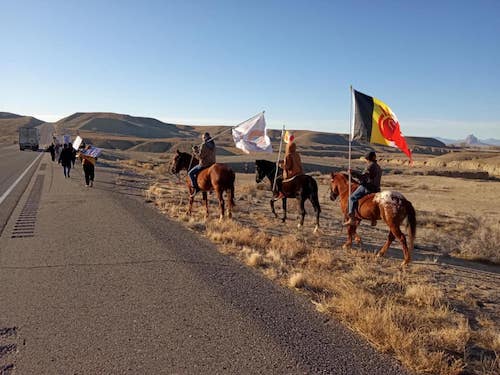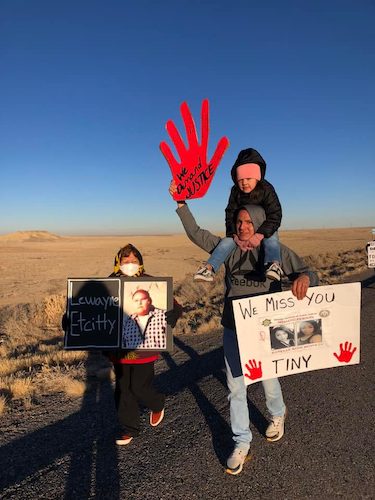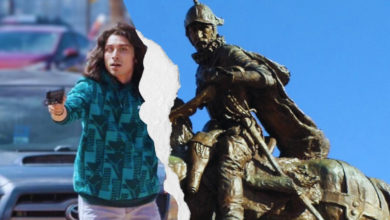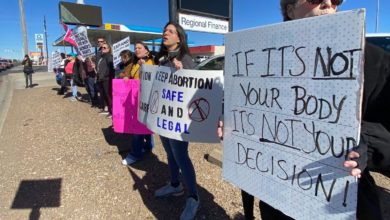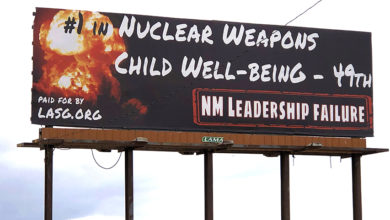On Saturday, Jan. 29, protesters in Shiprock, N.M., walked for miles in support of Missing and Murdered Indigenous Women. The organizers of this rally added an R to the acronym to include relatives other than women who are also missing or murdered.
Four groups of protesters began at each of the four directions and walked five miles to a park in Shiprock, a rural town in Northwest New Mexico on the Navajo reservation. The groups included the families of 20 MMIWR, community supporters, members of the local chapter of American Indian Movement, and members of the Albuquerque branch of the Party for Socialism and Liberation. Participants also included elected officials of the Navajo Nations, and four television news stations covered the action. Protesters carried signs with the names of those lost with their photos which included painted red hands — the symbol of MMIW.
MMIW, started by First Nation activists in Canada, is now a growing national movement calling for justice and investigations into murdered and missing Indigenous women. Native American women are murdered at a rate 10 times greater than the national average and face a disproportionately greater rate of sexual assault, rape and sex trafficking.
While MMIW began in Canada, it has taken root in New Mexico — the state with the third-highest Native American population in the United States. In 2017, a study conducted by the Urban Indian Health Institute discovered that New Mexico had the most MMIWR cases. Task forces have been set up in some states, including New Mexico, to investigate MMIW cases, but tribal leaders criticize them as empty gestures. Many MMIW activists see the movement as the continuation of resistance to the genocide that began with American colonization in 1492.
Those walking in Shiprock included parents, grandparents, siblings, children, nieces and nephews of those who are missing or murdered. They came with babies in wagons and elders in the backs of trucks. As they walked the rural roadsides, families in passing vans and livestock trucks honked in solidarity.
When the four groups came together in the Shiprock park, they chanted, “No more stolen sisters! No more stolen mothers! No more stolen brothers! No more stolen children!” and “What do we want? Justice!” The group then gathered around a pavilion to share potluck food. Families shared their stories on a microphone.
A history of negligence, dismissiveness by various police agencies
Liberation News spoke to some of the families at the Jan. 29 protest in Shiprock.
Grieving families described inattentive and careless police investigations that lasted for just a few days to a week. Families of MMIWR say that after just a week or two, police began refusing to take their calls, stopped responding to their voicemails, and ceased any effort to communicate progress on their cases. This neglect transcends local and tribal police to state and federal law enforcement.
Many families depend on friends and relatives to fill in the gaps left by police. Jerold Harrison, whose sister Ranelle went missing in June 2021, still searches on the weekends. “I was searching different towns asking people if anyone knew her. I had to quit my job.”
A lead brought Harrison to Shiprock, about 12 miles from his sister’s home. After three months of searching, he found some of her clothes: her slippers and jacket.
Geraldine Toya’s daughter Shawna was found dead in July 2021. Geraldine told Liberation News how the investigators told her there was no foul play in her daughter’s death, but their story did not add up.
“How can you say it was not foul play when you see her bleeding from the back of her head, when you see a bruise on her left cheek, when you see puncture on her left neck, a slash on her right neck — how can they say that that wasn’t enough to say someone killed her?”
Toya echoed Jerold Harrison’s experience with his search for his sister after police stopped making progress. “APD [Albuquerque Police Department], the judicial system, they’ve done us wrong, they’ve really done us wrong. I’m doing my own investigation, which I shouldn’t be doing. I’m doing someone else’s job and I shouldn’t be.”
Police claim ‘jurisdictional limits,’ give up on searching
Rose Yazzie, the mother of Jerold Harrison and his missing sister Ranelle, described police avoiding accountability by blaming other agencies. Navajo Nation police told her that they were waiting on a Bureau of Indian Affairs special agent from Albuquerque. Meanwhile, the BIA insisted that they could not do anything because they were waiting on the Navajo Nation police. Yazzie said, “They’re just sending us back and forth.”
Aldeena Lopez, whose son Calvin went missing in March 2019, told Liberation News that “the police department in Albuquerque told me, ‘since you’re from Farmington, it’s going to have to be Farmington police that investigates.’ But the last we heard from him was at the Love’s truck stop on the south side of Albuquerque. We haven’t heard anything else from the Albuquerque police.”
Geraldine Toya’s daughter Shawna lived in Albuquerque. “A lot of times they say there are all kinds of jurisdiction issues, but there is only one place that this happened, and it was in the city limits of Albuquerque. It didn’t have anything to do with the reservation, or having to collaborate with another department.”
Police blame the victim, say disappearances and deaths are due to drug use
Toya spoke about her daughter’s case to the crowd: “The toxicologist said she had meth, fentanyl, and cocaine all in her system. How could she have done all of them? Someone who never used drugs? They tell us there was no foul play. It’s not right. We need answers. We need justice.”
Families say this is a common tactic that police use to blame a missing or murdered victim: If they used drugs, police feel they are not worth the time and energy of investigation. But the families and their supporters understand the trauma that can make someone turn to drugs and alcohol and the horrible nature of the disease of addiction.
Calvin Martinez was struggling with drugs and alcohol when he went missing, his mother Aldeena Martinez told Liberation News. Martinez had tragically lost his partner and youngest child in a fire. After that, he struggled with depression and resorted to drugs and alcohol to self-medicate. Martinez, who worked construction and did not have a car, would hitchhike between Farmington and Albuquerque regularly. One day, he called his mother from a truck stop. It would be the last time anyone heard from him.
Martinez’s mother and others wondered how his life could have turned out differently if he had had access to the right services and support after the crisis of losing his partner and child. Instead, he was forced to commute long distances for work while suffering from intense trauma and the disease of addiction.
Families fight racism: ‘Indigenous people matter‘
Geraldine Toya and others demanded that police and investigators say the real reason they fail to investigate MMIWR cases: racism. “Is this why this is going on, because of discrimination? I feel so discriminated against because they make it sound like my daughter was nobody — she’s a person. She’s a human. Native American, Indigenous people matter.”
Becky Martinez, the sister of Calvin Martinez, told Liberation News that she wants the cases of MMIWR to get better media coverage. “I grew up in a border town, and they say racism is dead — it’s not dead. There’s racism every day, all day, and a lot of people that run Farmington, and run the big TV broadcasting, they’re not Native American.”
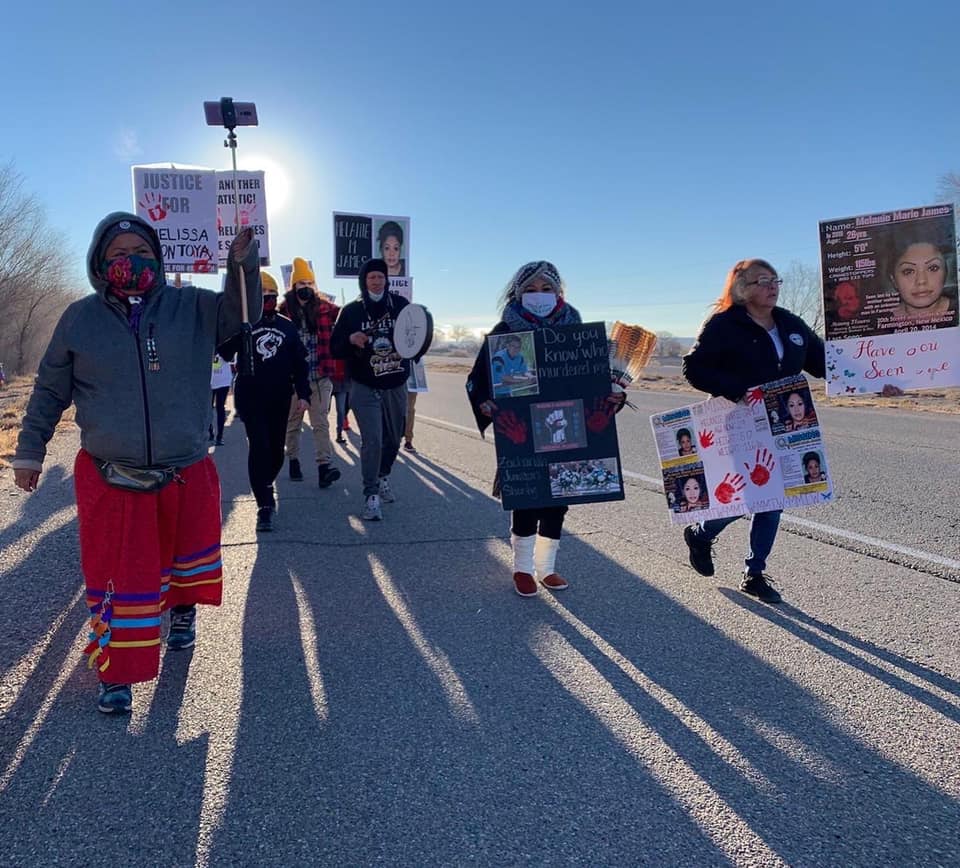
Jerold Harrison was happy to see families meeting one another. “I loved that all the families came together. I didn’t know this many people were missing. You see people on TV, but you don’t get it until it happens to you.”
Harrison wants the MMIWR movement to grow. When he spoke to the crowd, he shared, “When we first started, only three families were doing this. Every time we come out there are more and more people. Today, there are a hundred people here.”
“The more we come out the better. It’s getting recognized, even the news is here. Thank you for showing up.”
During the walk, Liberation News asked Ethelene Denny, whose daughter Jamie Yazzie went missing in June 2019, how she got connected. “My younger sister reached out to other families, and other families reached out to her, mostly on Facebook.” She said her goal is to “inspire other people, who aren’t going through this, to know what is happening.” As she walked, she raised her fist every time a car honked for the protesters.
Geraldine Toya said, “I haven’t seen an event this big. I went to my first rally in Albuquerque in October, and it’s becoming bigger and bigger. I’m very proud and I feel good about it, because what I see today makes me feel better and stronger, and because I know I’m not the only one going through this situation. Look at how many people are here supporting one another!”
Becky Martinez told Liberation News why the protest was necessary: “Some say, ‘oh, they just want attention.’ We’re not asking for attention, we’re asking for answers. I need to go out there. I need to raise awareness, and I’ve been doing it by myself. I finally got my own mother to come out today — she never comes with me. I want people to know that our family’s important too.”
Becky and Calvin Martinez’s mother, Aldeena Martinez, said, “I feel good that I came today, and I walked and I was welcomed. I was afraid, because I’ve never really asked for help — I guess that’s why I’m afraid, because no one ever helped me besides my family.”
“I need to be heard, just like everybody else is saying. I need them to know my son is missing. I need them to know I want him found, and I want to know where he is, and I want him back home. I would like to be able to know what happened — how he’s gone. And even to put him to rest if he’s gone.”
Photo: Family members of MMIWR march in Shiprock on Jan. 29. Liberation photo


